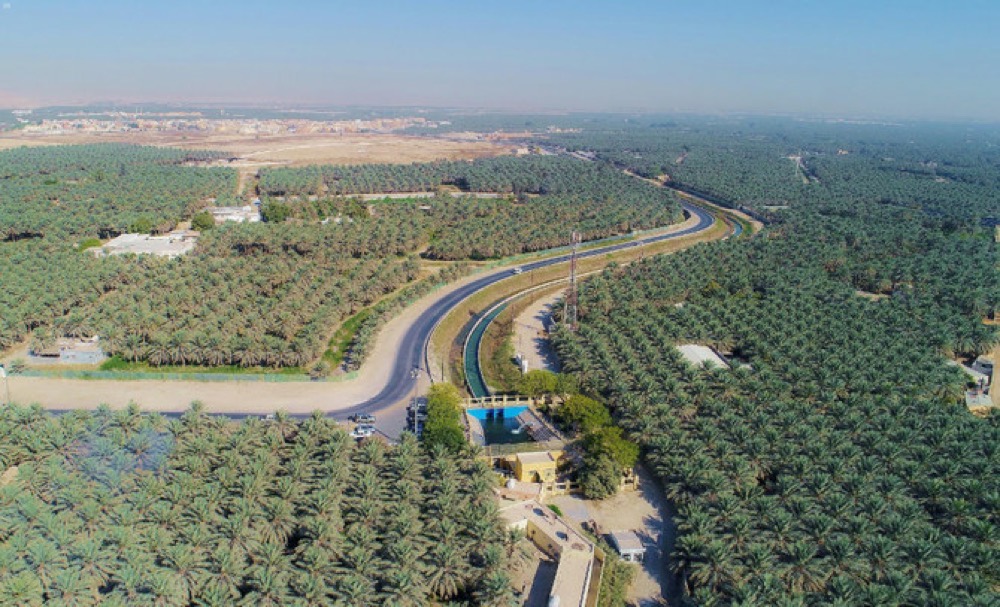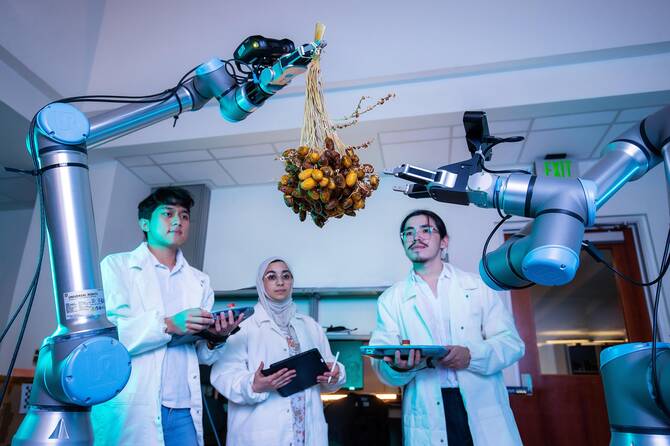RIYADH: Saudi Arabia is transforming its agriculture sector with advanced robotics aimed at boosting productivity and sustainability.
Artificial intelligence-powered machines are automating date-palm harvesting and managing irrigation, addressing labor shortages while optimizing water use in the Kingdom’s arid climate.
Backed by major investments and ongoing field trials, the country is also positioning itself as a leader in smart farming, with the goal of increasing crop yields and enhancing food security.
A key initiative in this push is a research project led by a team at the King Abdullah University of Science and Technology, which is developing an AI-driven robotic system to support local date farmers.
The project, headed by KAUST Assistant Prof. Shinkyu Park, focuses on automating critical tasks in date palm cultivation — including harvesting, pollination, and tree maintenance. By integrating robotics with AI, the team aims to improve efficiency and deliver higher yields of more nutritious dates.
The research was motivated by the pressing need to modernize and automate traditional practices in Saudi Arabia’s date palm industry, a sector that has long been central to the nation’s food security and economy, Park told Arab News.

The research was motivated by the pressing need to modernize and automate traditional practices in Saudi Arabia’s date palm industry. (SPA)
He said: “This research project seeks to reduce labor-intensive risks, enhance agricultural efficiency, and align with national priorities by positioning Saudi Arabia as a global leader in agricultural innovation.”
Saudi Arabia is the world’s second-largest date producer, according to the Food and Agriculture Organization, with production topping 1.9 million tonnes in 2024, as per data from the General Authority for Statistics.
But date harvesting is physically demanding. It requires farmers to climb tall trees and rely on years of experience to judge fruit ripeness — a clear opportunity for AI-powered robotics to make a meaningful impact, Park says.
To this end, the KAUST team, with support from the National Center for Palms and Dates, focused on precise date assessment to enable accurate harvesting using robotic systems.
Their research began with a well-established AI model that leverages high-resolution visual sensor data to identify individual dates and, at a later stage of the project, to classify both their species and ripeness — one of the project’s key milestones, Park noted.
“These models are continuously refined as we collect additional experimental data and gain insights from ongoing trials,” he said.

Date harvesting is physically demanding work that requires farmers to climb tall trees and rely on years of experience to judge fruit ripeness. (SPA)
Park said AI will be integrated into every major stage of the process — from identifying ripe dates and guiding robotic arms around palm trees, to optimizing grasping and harvesting using advanced machine learning.
Building on that foundation, the system combines robotic arms with specialized tools and AI-driven software to handle essential tasks such as harvesting, pollination and palm tree maintenance.
“The system will be developed to autonomously identify dates, female flowers, and tree trunks to support these operations,” Park said. “The robotic arms are engineered for high-precision movement, enabling the selective harvesting of ripe dates without damaging surrounding fruit.”
Opinion
This section contains relevant reference points, placed in (Opinion field)
In addition to harvesting, the robotic platform is designed to promote overall tree health. “Beyond harvesting, the system will also enhance palm tree health by enabling timely pesticide application to help prevent pest infestations and disease,” he said.
He pointed out that “the use of modern AI tools that leverage data is becoming essential in robotics, particularly when developing systems for deployment in complex, unstructured environments like date palm farms.”

“These AI-driven methods allow the system to adapt and improve over time,” he added. “AI will play a critical role in enhancing productivity by learning from operational data and continuously refining the robot’s performance across a range of agricultural tasks.”
To support this adaptability, the KAUST team’s robots are also fitted with vision-based systems and a range of sensors, including force/torque sensors at each joint. These components measure physical interactions during manipulation and provide real-time feedback to guide the robot’s actions.
Just as human farmers rely on fingertip pressure to sense whether they have successfully grasped a date, these sensors enable the robot to evaluate the quality of its grip on individual fruits.
DID YOU KNOW?
• Saudi Arabia is the world’s second-largest date producer, according to the Food and Agriculture Organization.
• The Kingdom has more than 33 million palm trees — about 27 percent of the global total.
• It grows over 400 varieties of dates, though only about 40 have significant economic value.
Further improving the system’s learning capabilities, human input plays a key role. Demonstrations of date palm harvesting, pollination and tree maintenance serve as valuable feedback for refining the AI models.
By continuously integrating sensory data with human expertise, the system evolves over time — much like a human apprentice gaining skill through guided, hands-on experience.
Still, a key challenge is how to deploy these systems reliably in natural outdoor environments. Park said this is where the AI models and sensing technology must prove themselves.
“The camera systems we currently use have demonstrated strong performance in other complex domains — such as underwater robotics, as validated in other projects in our lab,” he said.

The date palm industry has long been central to the nation’s food security and economy. (Supplied by Khalid Al-Ramadan)
“However, to achieve the level of precision required for accurate date detection in outdoor agricultural settings, we are also exploring additional sensing modalities, including LiDAR (Light Detection and Ranging), to improve robustness under diverse environmental conditions.”
He noted that “these efforts are closely integrated with the iterative refinement of our AI models, particularly as we gather more data during upcoming field trials to ensure accurate and reliable classification of date varieties and maturity levels.”
As Saudi Arabia increasingly embraces AI across industries, concerns about automation replacing human labor have surfaced. Park emphasized, however, that this technology is intended to complement — not replace — human expertise.
“Experienced date palm farmers remain indispensable for advancing best practices and overseeing day-to-day operations,” he said. “The primary goal of the system is to reduce the physical demands of harvesting while making advanced technologies accessible, even to smallholder farmers.
“Beyond its technical objectives, the project also aims to cultivate local talent and attract global expertise, fostering sustainable development and promoting knowledge exchange within the field of agricultural robotics.”

Saudi Arabia is the world’s second-largest date producer. (SPA)
Looking ahead, the KAUST team is preparing for real-world validation. During the 2025 field trial, Park said the research team aims to validate the first-year robotic system design under real-world farming conditions and collect extensive data to further enhance their AI models.
“These trials are essential for evaluating system performance, strengthening robustness, and accelerating progress toward full-scale deployment over the planned three-year development period,” he said.
“We intend to conduct field trials during every date harvesting season. While most of the engineering work is carried out in the KAUST robotics lab, these trials are critical for testing and validating the robotic system in practical agricultural environments.”















